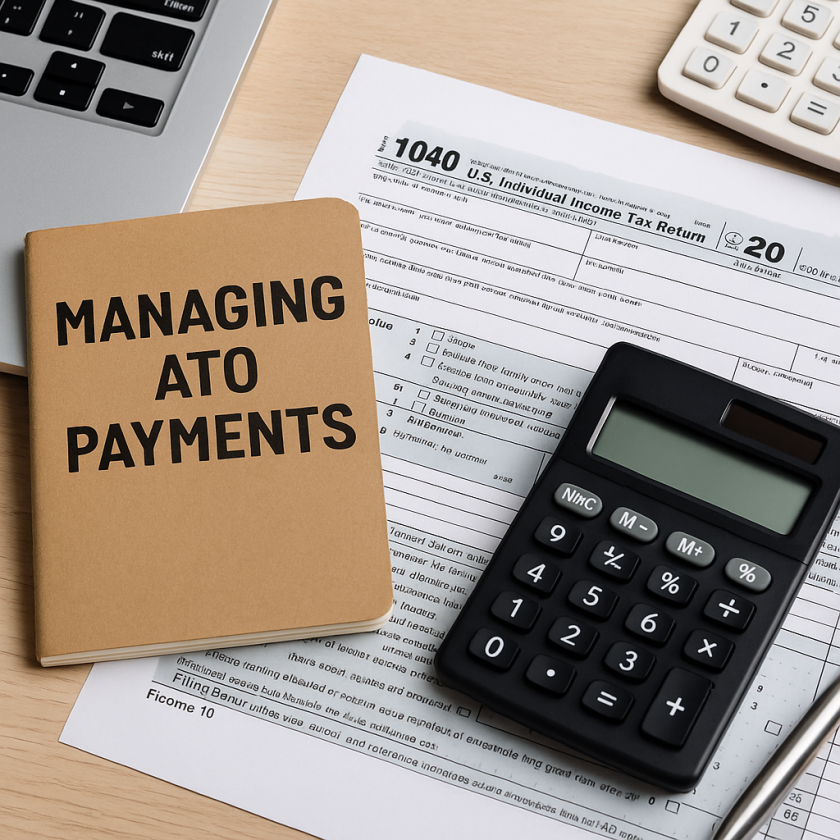
Managing ATO Payments Like a Pro: How to Stay in Control and Avoid Tax Debt
Running a business is about more than just keeping the doors open. It’s about staying on top of your obligations so you can grow with confidence. One of the biggest stress points for many small business owners is managing payments to the Australian Taxation Office (ATO).
Let’s unpack what it means for you and how Open Bookkeeping Australia (OBA) can help make it easier.
What “Managing Payments” Means
Managing your ATO payments simply means keeping track of what you owe and when it’s due, whether that’s GST, PAYG withholding, PAYG instalments. The goal is to avoid surprises and prevent a tax debt from building up.
The ATO encourages businesses to:
- Pay in full and on time whenever possible.
- Plan ahead for known obligations like quarterly BAS and super.
- Stay organised with accurate, up-to-date bookkeeping.
These might sound simple, but with multiple moving parts, invoices, payroll, supplier payments, it’s easy to fall behind without a clear system in place.
Tips to Stay on Top of Your ATO Obligations
The ATO offers a few key suggestions to help small businesses manage payments effectively. At OBA, we take those principles and apply them to real-world bookkeeping.
Here’s how:
1. Keep Your Records Current
Up-to-date bookkeeping gives you an accurate picture of what’s owed for BAS, PAYGW, and super. Using Xero or other accounting software means your figures are always current and we can reconcile and report efficiently.
2. Set Aside Funds Regularly
One of the most effective habits a business can build is transferring a percentage of income into a separate Operating Expense (OPEX) or Tax Reserve account. OBA’s Operating Expense Budgeting service helps clients calculate exactly how much to set aside each month to stay prepared for tax and BAS which is now included in all our bookkeeping packages.
3. Consider Pre-Payments
The ATO allows pre-payments meaning you can pay off part of your tax bill before it’s due. This helps smooth out cash flow and reduces the risk of falling behind.
4. Fix Payment Mistakes Quickly
If you’ve accidentally made a payment to the wrong ATO account (for example, a BAS instead of an income tax account), the ATO can transfer it for you. You just need to provide details such as the date, amount, and reference numbers.
⚠️ What Happens if You Miss a Payment
If a payment isn’t made by the due date, the ATO applies a General Interest Charge (GIC) on the overdue balance. Over time, that interest can add up, which is why proactive management is so important.
At OBA, we can help you track upcoming BAS, PAYG, and super deadlines, so you never miss an ATO payment again.
How OBA Can Help
At Open Bookkeeping Australia, we specialise in helping small business owners:
- Stay compliant with ATO deadlines
- Create and follow a consistent payment strategy
- Avoid late fees and interest charges
- Build long-term financial stability through better systems
Whether it’s through our Operating Expense Budgeting service, BAS preparation, or ongoing bookkeeping packages, our goal is to make your ATO obligations predictable — not stressful.
Final Thoughts
With the right systems (and the right bookkeeper), managing your ATO payments doesn’t have to be difficult.
If you’d like help building a plan for your business, or simply want to make ATO payments less confusing, book a free chat with Open Bookkeeping Australia today.










